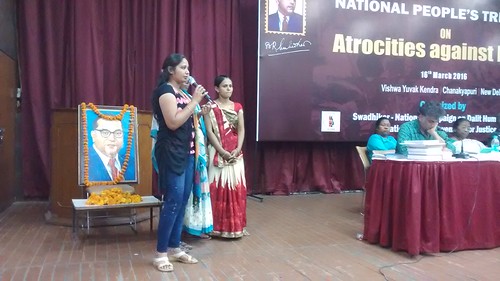By Amit Kumar for Twocircles.net
This is the third in a four-part series on cases of Dalit atrocities in India which were brought up during a tribunal held by the National Campaign on Dalit Human Rights in collaboration with other other liked-minded associations.
Delhi: For the past three and a half years, the Parmar family has been running from pillar to post for justice, but with little results: when the family came on stage at the National People’s Tribunal to talk about how three Dalits, including one from their family, had been killed and one person seriously injured in a police shootout, and spoke at length. Unlike other families, they did not break down on stage. They were accompanied by one of the employees of the National Campaign on Dalit Human Rights (NCDHR) and were helped by the fact that one of the jury members, Aakar Patel, Excutive Director, Amnesty International, spoke to them in Gujarati.
It was clear that the Parmar family had almost got used to talking about their tribulations, but to no avail:
In September 2012, the district of Surendranagar was hosting a festival. The town had been in a festive mode, until a small incident changed the lives of the Dalit families forever. During the fair, someone on a spinning wheel happened to drop something which fell on a person: the family of Parmar says it was probably an ice cream packet, or an empty water pouch: it matters little now. The argument soon turned into a massive fight between the Bharwads and the Dalits, and soon, the police had been called into action.
The Bharwads are not the most influential community in Gujarat; however, in the caste system, they are considered higher than the Dalits. The crowd got unruly, the police got agitated; the innocent got caught in between. Pankaj Sumra, was shot down by a stray bullet from the police. Even after injuring him, the police did not bother to take him to the hospitals and left the job to the relatives of Sumra. He was subsequently taken to the Thangadh Civil Hospital, from where he was against referred to Rajkot Civil Hospital, where he was declared dead.

The news of Sumra’s death sparked outrage among Dalits who took to streets, demanding a complaint to be filed against police officials responsible for the death. Instead of taking action against the guilty police officers, the police instead decided to clamp down on any subsequent protests. The protests occurred on September 23, during which the police, once again, opened fire. It was during these protests that Prakashbhai Babubhai Parmar, 26, Mehulbhai Valjibhai Rathod, age 17, were shot at and succumbed to injuries. Prakashbhai was shot in the head, and died on the spot. Meanwhile, another youth, Chhanabhai, 28, remained in hospital for months after the incident due to the severity of his injuries.
A common theme in this series has been the reluctance on the part of the Police to file cases, especially when the Dalits are at the receiving end of the crime. In this case, it was even worse for them as the guilty/accused were all policemen. No wonder then, that when these incidents occurred, the police refused to file FIR against guilty officers initially. It was only after intense pressure that the four accused officers were booked under IPC Sections 302, 147, 148, 149, 114, 120-B and under the SC/ST (PoA) Act, 1989, Section 3 (2).
However, in return, the police also filed a case against Dalit youth against seven Dalit youth for protesting the death of Sumra. They continue to be in jail. Also, importantly, the SSP was missing the day the firings took place. He was busy making security arrangements for the Swami Vivekananda Yatra of the then Chief Minister of Gujarat, Narendra Modi.
The wife of Prakash Parmar, who had come to the Tribunal organised by the National Campaign for Dalit Human Rights (NCDHR) in organisation with National Movement for Dalit Justice, spoke to Twociricles.net. “The protests that followed the death were Sumra were meant to be peaceful, asking police to take action. We (Dalits) live on the other side of the railway tracks. Our protests were stopped in the way, before we even crossed the railway station, and we were shot at,” she said.
Deepika Rathod, the NCDHR worker from Gujarat, who had accompanied Parmar’s family, said the lackadaisical nature of the Police is clearly evident in the way they followed the case. “Even after three and a half years, the chargesheets have not been filed, while Dalit youths remain in jail over protesting against the death of one of their own. Who do we approach now?” she asked.
As early as October 2012, Manjula Pradeep, the director of Navsarjan had written to the National Human Rights Commission. It was not April 2014 that they replied, saying that “it has been revealed that the matter is being probed by the Commission of Inquiry. Monetary relief has also been paid in this matter and process of land allotment is also under consideration. Moreover, law is taking its own course and no further action is called for.”
It was the point of compensation that the jury focused on, adding that merely paying compensation is not justice itself: punishing the guilty is. In this case, a compensation of Rs 7.5 lakh to the families is not merely enough. Also, importantly, no job has been given to the family and for the family of Prakashbhai Parmar, who worked as a daily wage labourer in Thangadh, the times have been tough to say the least, with no end in sight. The Tribunal was one place where they could speak their heart out, and so they did. But since when has being honest ensured justice?
Related:
Where has all the anger gone? Dalit survivors of Sunped wonder as they fight for justice
Nine months after attack, Dalits of Samastipur wait for justice while accused roam freely

